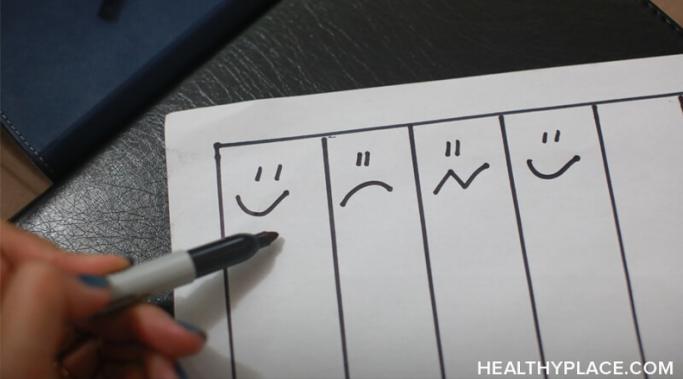I am not an angry or an aggressive person. This is not to suggest I don’t have my moments, as we all do, but overall, I have far fewer issues with anger than most people I know. There are lots of reasons for this, I’m sure many have to do with my psychology the way I view anger (I view it as pointless and particularly undesirable).
Nevertheless, it seems that people with bipolar disorder do, on the whole, have anger issues. I’m a bit surprised to hear this as anger is not a diagnostic feature of bipolar disorder, but people write in again and again and talk about either having bipolar and being very angry or being with someone who has bipolar and this partner being very angry.
But are these just anecdotal accounts or do people with bipolar disorder have aggressive and angry tendencies?
Understanding Mental Illness
Last time, I wrote about the terrors of getting on new bipolar medication. Many people identified with this, including one commenter who said:
Sounds all too familiar. I’ve been drug free for several years and seriously doubt that I will ever put myself through that trial and error program again . . . at least for me, that relief is not to be found at the bottom of an orange vial with a childproof cap. I hope you find something to relieve the pain. I also hope you consider the notion that you’re likely stronger and more resourceful than you think you are.
Now, I’m not calling out this commenter for doing anything wrong. I have no problem with his comment, nor with him. However, I find this comment insulting. Not because the commenter meant it to be, but because it suggests that people who don’t take medication for bipolar disorder are “stronger and more resourceful” than those who do.
I have talked many times about how important a routine is in bipolar disorder (Limitations and Rules that Keep Us Safe). There are many reasons for this, but one of the main ones is because bipolar disorder is considered a circadian rhythm disorder by many medical professionals. Your circadian rhythm is critical to your functioning as a human as it tells your body when to sleep and when to be awake (among other things) and trying to go against it is like swimming upstream. Assuming bipolar disorder is, indeed, a circadian rhythm disorder, we should do everything we can to work to regulate our circadian rhythms in a healthy manner. Keeping a strict bipolar routine is one major way of doing that.
After reading my last post, Starting Conversations About Bipolar Disorder (When You Don’t Have Bipolar), a commenter requested a similar piece on how to start conversations on mental illness when you do have bipolar disorder. I thought this was a good question as it’s as hard for people with a mental illness to bring up this tough subject as it is for those around us. After all, we don’t want to frighten people or get into major emotional upset.
So are there things to consider when bringing up bipolar disorder with people who don’t have a mental illness?
Mental illness is a daunting subject matter for anyone. Thinking of how to approach a conversation about bipolar disorder would scare the pants off of the most politically correct of animals.
And yet conversations about mental illness must be had if we are to propagate understanding among those with a mental illness and among those who don’t. And it’s brave of someone, anyone, to want to start the conversation about bipolar disorder or another mental illness, knowing how much stigma is out there.
But is there a “right” way to handle talking about mental illness?
In one year I write over 100 blog articles for Breaking Bipolar. I’m honoured to say that many people have responded to this writing and it has spawned many great conversations. Popular topics this year ranged from self-harm to passing down of bipolar to your kids to the understanding of mental illness.
Check out these popular articles you might have missed.
As happens from time to time, I recently received feedback from someone who was not a fan. Anonymous's remarks included:
…The way you go about it, you’d suggest that anyone with bipolar or any kind of mental illness shouldn’t lead a full life.
Let me be clear. You can lead a full life. Anyone can. What I recommend is calibrating your definition of “full” to allow for a mental illness.
In my last article I wrote about creating reasonable expectations for the holidays and how that can help your mental health. Today, I want to talk about the stress of holidays with family.
Now, don’t get me wrong, family can be great, but more often than not, holidays cause a gathering of family members you both gel with and those you don’t and I hear from a lot of people that they hate such family gatherings. But why? Are family gatherings worse for people with a mental illness?
There are some truly wonderful people out there who are loved ones of people with mental illnesses. These people want to help their loved ones with mental illnesses and many of them read this blog in an effort to understand what it’s like to have a mental illness and how they can help.
It’s a beautiful thing.
So if you’re the loved one of a person with a mental illness, here are some things you might want to think about during the holidays.
You’d let them take an ice pick to your brain if you thought it would help.
Bipolar disorder impacts different people differently. For some people, bipolar disorder is immanently treatable. These people find doctors, therapy and medication and walk off into the sunset with few bipolar symptoms left with which to contend. These people lead the same lives as everyone else and besides (likely) controlling certain lifestyle factor that contribute to stability, they don’t have to think about bipolar disorder on a daily basis.
Then there are the people who are more affected by the illness. These are people for whom treatment partially works. They likely find doctors, therapy and medication too, but in spite of best efforts, they live with bipolar symptoms every day. These people might live your ordinary life or might live a life that is more affected by the illness, such as one where they can only work part-time.
And then there are the people that are severely affected by bipolar. Even with treatment these people tend to have intractable moods and likely can’t work because of them. These people do not live average lives. They live lives dictated by the illness and the treatment. These people are in pain every day.
And it’s only chance that places you in one of those three groups.

![MP900178847[1]](/sites/default/files/styles/blog_listing/public/uploads/2013/01/MP9001788471.jpg?itok=Ts8tL5qv)


![MP900386298[1]](/sites/default/files/styles/blog_listing/public/uploads/2013/01/MP9003862981.jpg?itok=1g5eE5XN)
![MP910218832[1]](/sites/default/files/styles/blog_listing/public/uploads/2013/01/MP9102188321-1024x684.jpg?itok=DRi_Ifa_)

![MP900440934[1]](/sites/default/files/styles/blog_listing/public/uploads/2012/12/MP9004409341.jpg?itok=O3b_8H6w)

![MP900321197[1]](/sites/default/files/styles/blog_listing/public/uploads/2012/12/MP9003211971.jpg?itok=MBDqb95X)